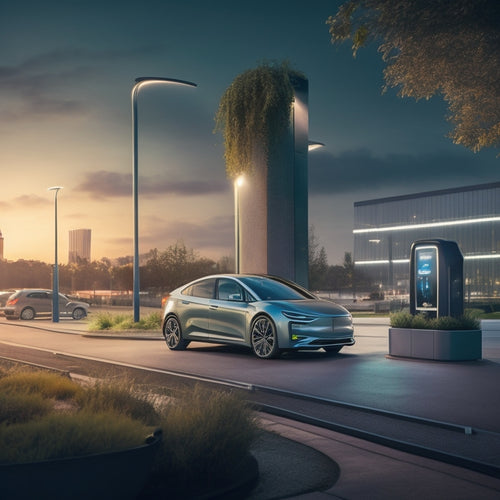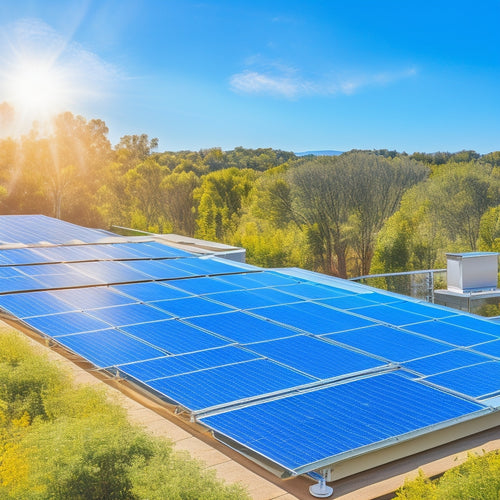
Why Off Grid Homes on a Budget Thrive
Share
You're opting for off-grid living on a budget, and it's easy to see why: with affordable solar energy systems, budget-friendly off-grid essentials, and DIY solar panel installation, you can greatly reduce your energy bills and achieve energy independence without breaking the bank. By adopting energy-efficient habits, prioritizing energy system setup and maintenance, and choosing the right renewable energy sources, you'll be well on your way to a self-sufficient lifestyle. As you investigate these cost-effective strategies, you'll find that living off the grid on a budget is not only possible but also enabling - and there's much more to uncover.
Key Takeaways
- Affordable solar energy systems and energy-efficient appliances reduce energy consumption and costs, making off-grid living on a budget possible.
- Implementing water conservation techniques, such as rainwater harvesting and low-flow fixtures, minimizes waste and reduces expenses.
- DIY solar panel installation and maintenance can significantly reduce labor costs and enhance energy independence.
- Prioritizing energy efficiency and adopting sustainable practices, like composting and recycling, contribute to a self-sufficient lifestyle.
- Financing options, like power purchase agreements, and budget-friendly off-grid essentials, such as composting toilets, make off-grid living more accessible.
Affordable Solar Energy Systems
Freedom from the grid starts with utilizing the power of the sun. You can tap into its energy to power your off-grid home without breaking the bank. Affordable solar energy systems are now more accessible than ever, offering significant solar savings.
By investing in efficiency upgrades, you can maximize your energy output while minimizing costs. Consider upgrading to high-efficiency solar panels, which can increase energy production by up to 20%. Additionally, energy-efficient appliances and LED lighting can reduce your overall energy consumption.
When planning your solar energy system, it's crucial to consider the energy storage needs and the potential for system expansion when planning. By combining these strategies, you can enjoy reliable, sustainable energy while keeping costs in check.
With the right solar energy system, you can take the first step towards an off-grid lifestyle that's both environmentally friendly and budget-friendly.
Budget-Friendly Off Grid Essentials
Your off-grid home's essentials should be just as affordable as its energy system. You'll need budget-friendly solutions for water collection, sanitation, and waste management.
One essential is a water collection system, which can be as simple as installing rainwater harvesting tanks or building a well. For sanitation, consider composting toilets, which reduce water consumption and produce useful fertilizer. A septic system or outhouse can also be cost-effective alternatives to traditional plumbing.
Furthermore, implement a recycling and composting program to minimize waste and reduce your environmental footprint. By adopting these budget-friendly essentials, you'll be well on your way to creating a sustainable and self-sufficient off-grid home.
In addition, renewable energy solutions like solar power and biogas energy can also contribute to your off-grid home's energy independence, reducing your reliance on fossil fuels and lowering your energy bills.
DIY Solar Panel Installation
You're about to save big on your off-grid home's energy costs by installing your own solar panels.
To guarantee maximum energy production, consider proper panel sizing to meet your energy requirements effectively, and don't forget to minimize gaps and obstructions(https://www.illchanterhislater.com) in your panel layout for maximum efficiency.
To get the most out of your system, you'll need to optimize panel angle, simplify wiring, and choose the right inverter.
Panel Angle Matters
Optimizing the angle of your solar panels is crucial for maximizing energy production.
You'll want to find the ideal tilt for your location, which typically ranges from 30 to 40 degrees. However, you'll also need to take into account seasonal adjustments.
During the summer months, a slightly flatter angle can help you take advantage of the sun's higher position in the sky. In the winter, a steeper angle will guarantee you're capturing as much energy as possible from the lower sun.
Don't be afraid to experiment and adjust your panel angle throughout the year to enhance your energy output. With a little trial and error, you'll be generating power like a pro in no time.
Wiring Made Simple
Three critical components - the solar panels, charge controller, and battery bank - must be properly connected to capture the power of the sun.
You'll need to focus on basic wiring to guarantee a safe and efficient system. Start by connecting the solar panels to the charge controller, making certain to match the voltage and current ratings.
Next, connect the charge controller to the battery bank, following the manufacturer's instructions. Always follow safety precautions, such as wearing protective gear and avoiding over-tightening connections.
Use the correct gauge wire and keep the wiring tidy to prevent damage or electrical shock. With careful planning and attention to detail, you'll be able to utilize the sun's energy and power your off-grid home.
Inverter Selection Tips
Your off-grid home's solar panel system relies on an essential component: the inverter. This device converts the DC power generated by your solar panels into usable AC power for your home.
When selecting an inverter, you'll need to choose from three main inverter types: string inverters, microinverters, and power optimizers. Each type has its pros and cons, so consider your system's specific needs before making a decision.
Proper inverter sizing is also vital. Make certain your inverter can handle the maximum power output of your solar panel array. Oversizing can lead to wasted money, while undersizing can result in reduced system performance.
Calculate your inverter size based on your system's voltage, current, and power output to guarantee efficient energy conversion.
Energy Independence on Budget
You're looking to achieve energy independence without breaking the bank.
To get started, you'll want to investigate renewable energy sources that can greatly reduce your reliance on the grid.
Renewable Energy Sources
A solar panel array mounted on a rustic barn roof or a whisper-quiet wind turbine spinning lazily in the breeze - these are the hallmarks of a renewable energy system designed to wean you off the grid.
You can utilize wind energy to power your home, reducing your reliance on fossil fuels and slashing your energy bills.
Here are three renewable energy sources to evaluate:
-
Wind Turbines: Convert wind energy into electricity, ideal for rural areas with consistent wind patterns.
-
Geothermal Heating: Exploit the earth's natural heat to warm your home, perfect for regions with accessible geothermal resources.
-
Solar Power: Tap into the sun's energy to generate electricity, suitable for homes with ample roof space and sunlight.
Low Cost Power Options
Achieving energy independence doesn't have to break the bank. You can tap into low-cost power options that'll get you off the grid without draining your wallet.
Consider wind power, which can be utilized using affordable turbines. These turbines can be installed on your property, generating electricity at a lower cost than traditional sources.
Another option is hydro energy, which exploits the power of moving water to produce electricity. If you live near a stream or river, a small hydroelectric system can be an efficient and cost-effective way to generate power.
Grid-Free Living Made Easy
Every aspect of off-grid living can be simplified with the right mindset and strategies.
You'll find that adopting a few key habits and techniques can make a huge difference in your daily life.
Here are three ways to get started:
-
Master water conservation techniques: Implement low-flow showerheads, fix leaks promptly, and harvest rainwater for non-potable uses like flushing toilets and washing clothes.
-
Embrace permaculture gardening: Design your garden to work with nature, not against it. This approach will reduce water and fertilizer needs, while increasing crop yields.
-
Streamline your daily routine: Create a schedule that allows you to make the most of natural light, reducing the need for artificial lighting and heating.
Off Grid Energy System Costs
With off-grid living, one of the most significant expenses you'll face is setting up an energy system that can power your home. The cost of an off-grid energy system can vary widely, depending on your energy needs and the type of system you choose.
However, there are ways to keep costs down. Focusing on energy efficiency is key; this means using energy-efficient appliances and lighting, as well as insulating your home to reduce heat loss.
Regular system maintenance is also vital to guarantee your system runs smoothly and efficiently. By prioritizing energy efficiency and maintenance, you can reduce your energy system costs and enjoy a more affordable off-grid lifestyle.
Solar Power on a Shoestring
You can slash your energy bills and carbon footprint by utilizing the power of the sun, even on a tight budget. While the initial cost of a solar panel system may seem intimidating, there are ways to make it more affordable.
-
Explore solar financing options: Many companies offer financing plans or power purchase agreements that can greatly reduce upfront costs.
-
Start small: Begin with a smaller system and expand as your budget allows, ensuring you're generating some free energy from day one.
-
Combine with energy efficiency upgrades: Implement energy-saving measures like LED lighting and insulation to maximize the impact of your solar power system.
Frequently Asked Questions
Can I Live off the Grid in an Urban or Suburban Area?
You can cultivate a self-sufficient oasis in the midst of urban or suburban chaos by embracing urban agriculture, energy independence, and community resources, while steering through zoning regulations, water sourcing, and alternative housing options that work for you.
Will Off-Grid Living Affect My Internet and Phone Connectivity?
You'll find that off-grid living doesn't have to mean sacrificing internet and phone connectivity; you'll have various internet options, such as satellite, mobile hotspots, or fixed wireless, and connectivity solutions like signal amplifiers to guarantee you stay connected.
How Do I Handle Human Waste Disposal off the Grid?
You'll need to handle human waste disposal off the grid by considering composting toilets, which turn waste into fertilizer, and greywater systems, which reuse water from sinks and showers for irrigation.
Are Off-Grid Homes More Prone to Natural Disaster Damage?
While luxury homes often crumble under natural disasters, you'll find that off-grid homes, built with resilience in mind, can withstand the fury of nature, thanks to intentional design and natural disaster preparedness, making them a guiding light of hope in turbulent times.
Can I Finance an Off-Grid Home With a Mortgage?
You can finance an off-grid home with a mortgage, but be prepared for alternative financing options, as traditional lenders may be hesitant; prioritize energy independence and research specialized lenders that cater to off-grid properties.
Related Posts
-

Solid State Batteries in Electric Vehicles
Solid-state batteries revolutionize electric vehicles by offering a longer lifespan and higher energy density than tr...
-

What Types of Solar Energy Devices Are Available
You'll find several types of solar energy devices available today, each customized to different energy needs. Photovo...
-

Essential Hiking Lights for Safety and Fun
When you're hitting the trails, essential hiking lights are vital for safety and fun. A lightweight headlamp offers h...


